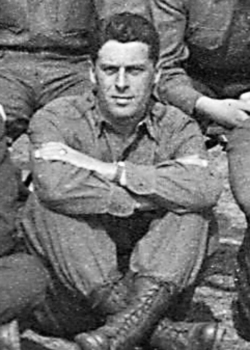 George W. King
George W. King
Biography: George William King Jr. was born June 23, 1914, in Worcester, Massachusetts. He was the son of George W. King and Barbara Moynihan. The 1940 U.S. Census shows George had completed 4 years of college, was living with his brother’s family and working as a teacher. His draft card, dated October 16, 1940, indicates he was employed by the City of New Bedford School Department in New Bedford, MA.
Service Time: George entered the Army on November 6, 1942. He was assigned and joined Company C of the 607th Tank Destroyer Battalion on December 28, 1942, while the unit was stationed at Camp Hood, Texas. He trained at several additional locations including Camp San Luis Obispo, the Desert Training Center and Camp Cooke, all in California. He was promoted to Private First Class on March 13, 1943. We do not have unit Morning Reports for the 2 nd half of 1943, but at some point, during that period, George was sent to Officer Candidate School. He would have been appointed as a 2nd Lieutenant upon graduation. On December 10th of that year, he was promoted to 1st Lieutenant. While they originally trained with M10 self-propelled tank destroyers, the unit was converted to a towed battalion, utilizing the M5 3” anti-tank gun, on December 15, 1943.
Arriving at Liverpool, England, on April 21, 1944, they continued training. Company C landed at Utah Beach, Normandy, France on June 23rd and the 607th supported the advance on Cherbourg, fighting along the Seves River in July and joining the drive to Le Mans and envelopment of the Falaise Pocket in August. On the 19th, Lt. King’s platoon destroyed two enemy tanks and a large self-propelled gun. The unit advanced to the Moselle River in September and supported operations against Metz through late November. They converted to a self-propelled battalion equipped with M36 tank destroyers in time for the final assault on Metz.
In late November, as the 607th was approaching the Saar River near Saarlautern, Germany, the German artillery laid down a fierce barrage from the high, dominating hills southeast of Falck. Lt. King was charged with defending the town pending the arrival of reinforcing infantry. Numerically superior German infantry moved down the southern ridge onto the town as Lt. King deployed his tank destroyer platoon with the few automatic weapons at his disposal into a defensive position. Under a further barrage of artillery and mortars the Germans struck stealthily, endeavoring to infiltrate the American positions, but his platoon fought back fiercely and repulsed them. Again, and again the enemy repeated his tactics, only to find the defense impenetrable. Credit for the successful defense of Falck against overwhelming enemy numbers was largely due to Lt. King’s initiative and gallantry for which he was awarded the Silver Star medal.
The unit participated in the attack on Saarlautern, Germany, in December and were deployed to the Ardennes sector in January, 1945, and again committed against the Siegfried Line in February in the Schnee Eifel. Supporting the capture of Koblenz, Germany, in mid-March, they crossed the Rhine River at Boppard on March 25. The 607th continued to drive east through Hessen and Thüringen during April and reached the Czechoslovak border near Plauen by mid-April. Thereafter, they remained in defensive positions until VE Day.
In addition to the Silver Star, George was awarded a Bronze Star Medal, the EAME Medal, with credit for the campaigns of Normandy, Northern France, Rhineland, Ardennes and Central Germany, along with the American Campaign and WWII Victory medals.
He returned home with the 607th aboard the SS George Washington, leaving the ETO on October 15, 1945. George remained in the Army for a period after returning home and was discharged on January 13, 1946 at the rank of Captain.
After returning home, sometime in the 1940’s, George married the former Lucille C. Pedroza who was born in New Bedford, MA. She was the daughter of Alfred L. Pedroza and Virginia Sylvia. The couple had two children, David and Russell. He went back to work at the Cooke and the John B. DeValles Schools, retiring as a principle. George passed away on February 6, 1978, and was buried in the St. John Cemetery, New
Bedford, MA.
